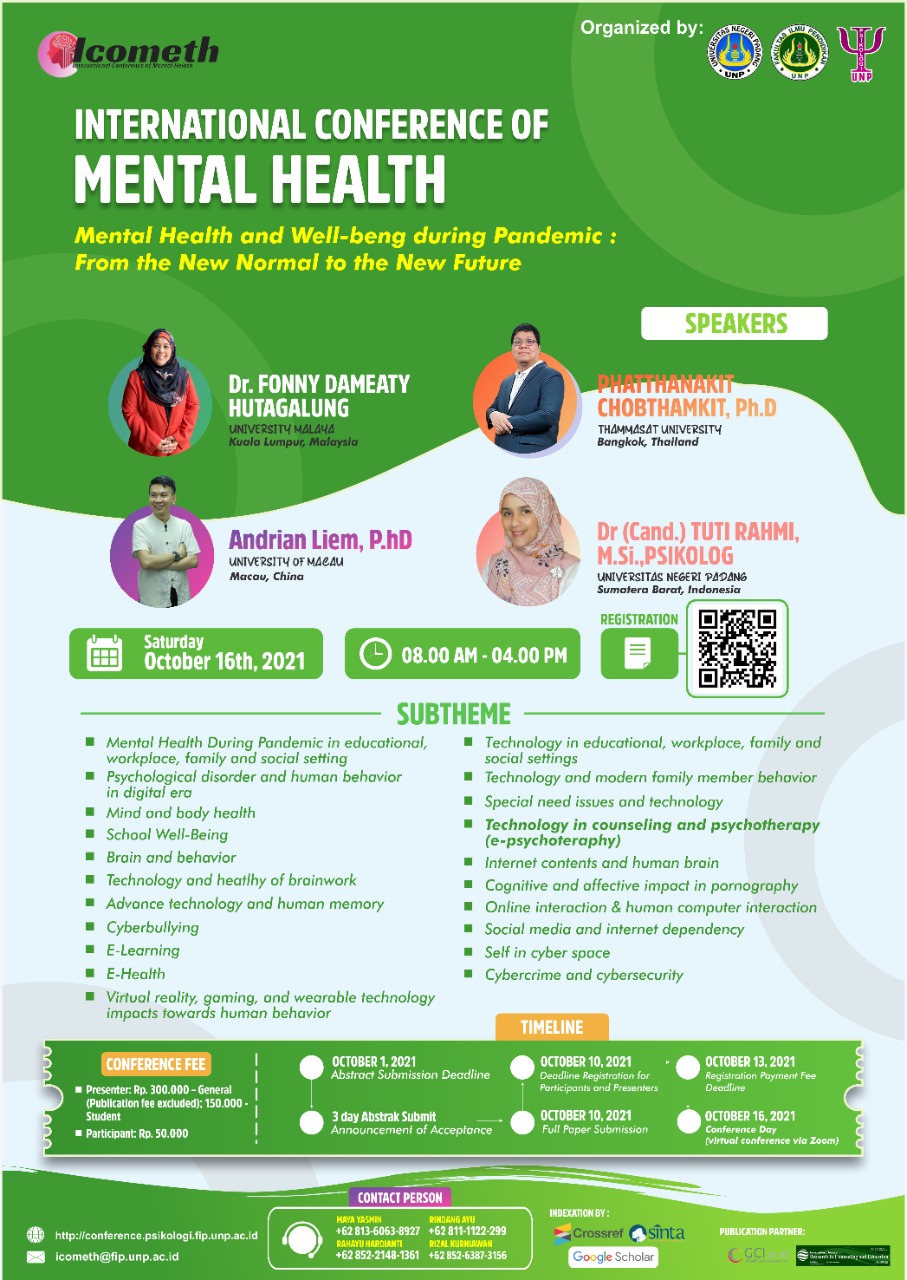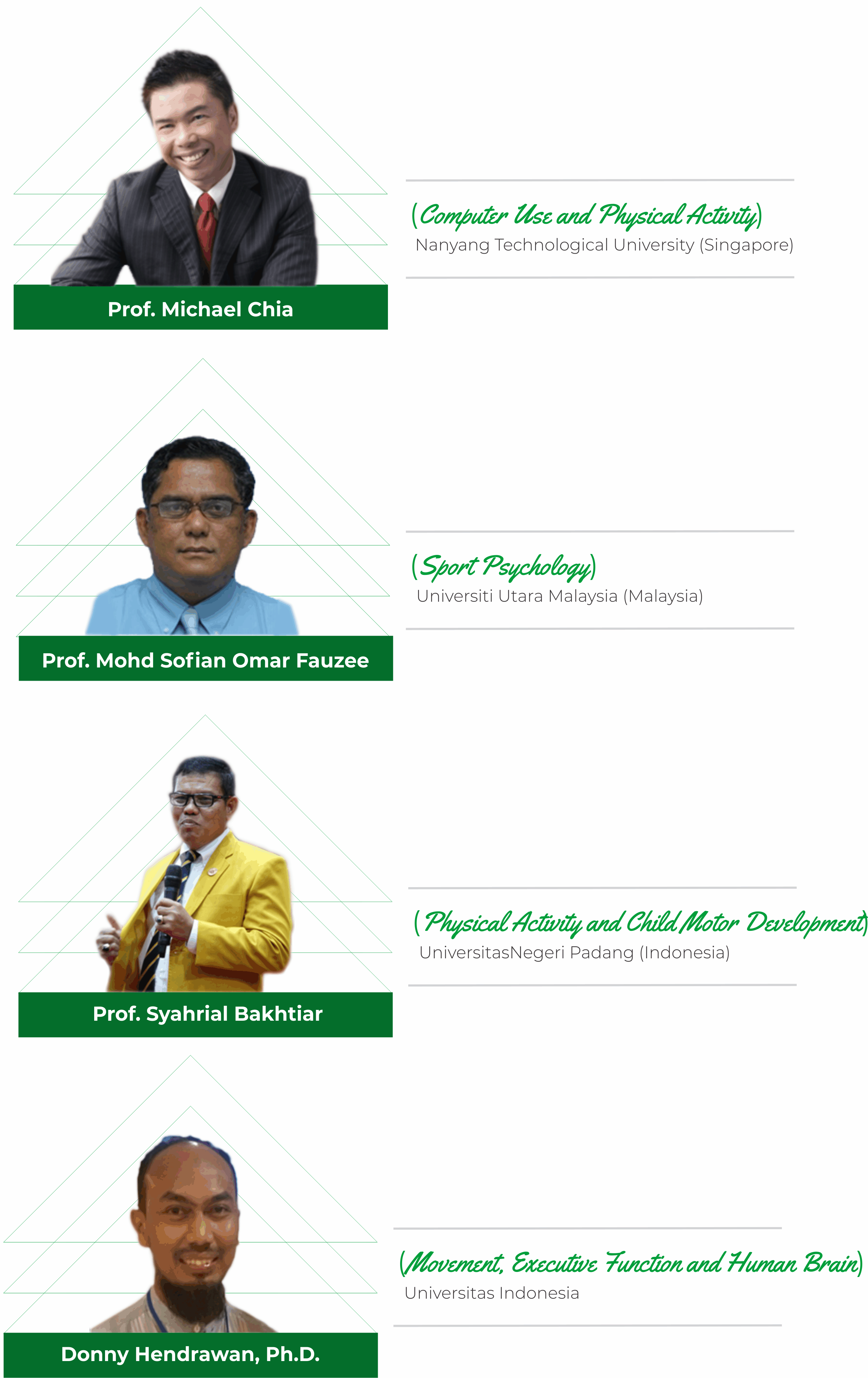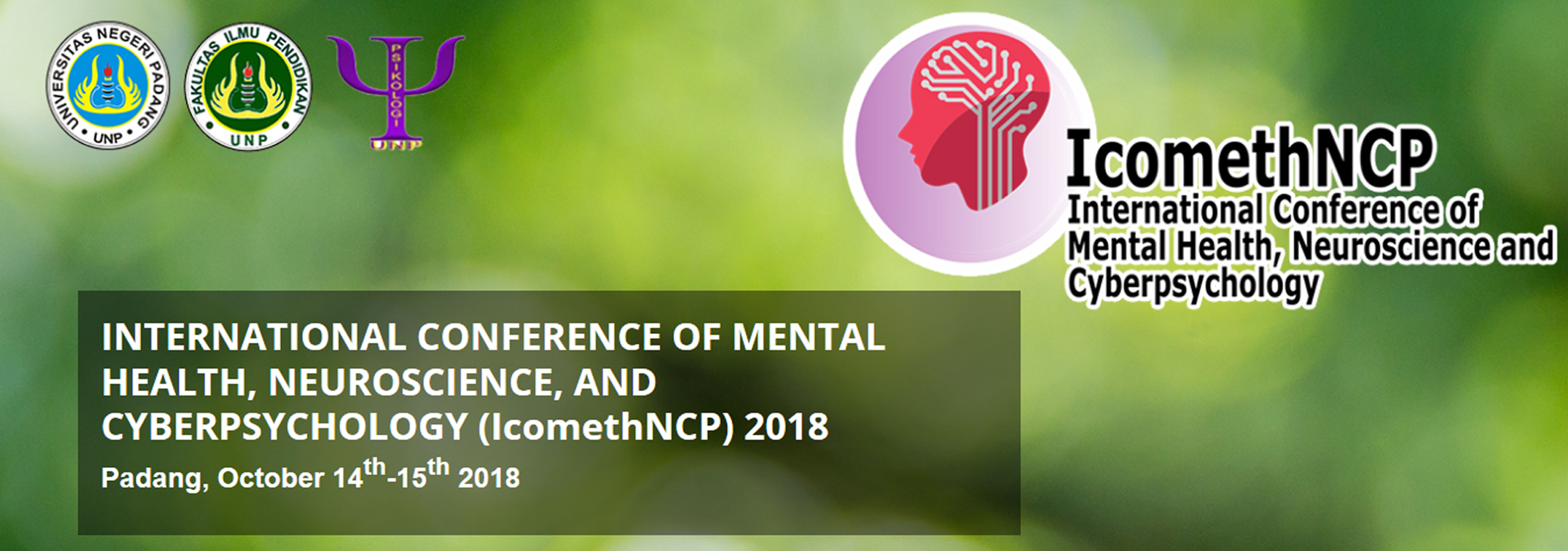Mental Health and Well-Being During Pandemic: From The New Normal To A New Future
-
Mental Health and Well-Being During Pandemic: From The New Normal To A New Future
October 16, 2021 – October 16, 2021BACKGROUND
The current pandemic situation has a significant impact on human life, namely health, education, economy, and various aspects of life. The pandemic situation brings drawbacks and advantages when viewed from a different point of view.
The impact of the COVID-19 pandemic has become a critical and exclusive topic. It has become a reference for research that has recently been discussed in science development because this affects human life's sustainability in the future. One of the influences is mental health. When viewed from a mental health perspective, according to WHO, mental health is a condition of well-being that is recognized by individuals, in which there are abilities to manage everyday life stress, to work productively, and to participate in the community. Mental health is also related to the human's adequate ability to deal with problems encountered in life. Every human being will face problems in his life and psychological problems; one of them is stressors. Stressors have various forms; anything that makes human life change can also become stressors. It is something that has been eagerly awaited during this pandemic.
In this case, mental health not only covers individuals but also reaches the group and community level. So that, mental health during this pandemic also enters education, health, and the world of work. Habits and adaptation to this pandemic will have a good impact on human survival in the future.
As an education campus and supporting the Changes in the era of Globalization and Industry, Universitas Negeri Padang certainly also contributed to this seminar with exciting ideas from the studies presented at this seminar to impact society.
EVENT
INTERNATIONAL CONFERENCE OF MENTAL HEALTH
THEME
Mental Health and Well-being during Pandemic: From the New Normal to a New Future
SUB THEME
- Mental health during pandemic in educational, workplace, family and social setting
- Psychological disorder and human behavior in digital era
- Technology in educational, workplace, family and social settings
- Technology and modern family member behavior
- Special need issues and technology
- Mind and body health
- Technology in counseling and psychotherapy (e-psychoteraphy)
- School Well-Being
- Brain and behavior
- Technology and heatlhy of brainwork
- Advance technology and human memory
- Internet contents and human brain
- Cognitive and affective impact in pornography
- Online interaction & human computer interaction
- Social media and internet dependency
- Self in cyber space
- Cyberbullying
- E-Learning
- Addiction to technology
- E-Health
- Virtual reality, gaming, and wearable technology impacts towards human behavior
- Cybercrime and cybersecurity
SPEAKERS
- Dr. Fonny Dameaty Hutagalung
University of Malaya - Phatthanakit Chobthamkit, Ph.D
Thammasat University - Dr. (cand.) Tuti Rahmi, M.Si., Psikolog
Universitas Negeri Padang - Adrian Liem, Ph.D
University of Macau
PLACE AND DATES
Padang, West Sumatera, Indonesia on 16 October 2021.
This conference will be held online via Zoom Meeting.
The 2nd International Conference of Mental Health, Neuroscience and Cyber Psychology (ICOMETH-NCP)

-
The 2nd International Conference of Mental Health, Neuroscience and Cyber Psychology (ICOMETH-NCP)
October 26, 2019 – October 27, 2019Keynote Speakers

Background
The acceleration of technology in recent decades has changed human behaviors significantly. People do many things manually in the past, for instance: sending messages through letter and the post man will send the letter and sender will get the reply in weeks. While, today, the message can be done in second in different country through smartphone or social media. It has changed both in positive and negative manners. In positive manner, activities are made easy. People do not have to make window shopping to buy cheaper products in the market. They just have to search in mobile applications and recognize the specifications needed. On the other hand, it also makes negative effects to human. Children tend to get game addiction and they cannot interact with peers as it used to be done by children in the last decades. It changes the way child interact socially.
One aspect which is influenced by the changes of technology is human physical activity. It occurs in human life span, in children, adolescents, and adults. In children, they have lack of physical activity as the time used for playing games using smartphone. For adolescents, they have sleep deprivation for the game addiction and tend to avoid social interaction in real life. For adults, they do not have make physical activities outside the building and have the physical problem like obesity and less exercise.
Movement, exercise and other physical activities have been used for therapy. Sensory integration and occupational therapy have long been used to treat children with special needs. They make the physical balance, crawling, matching pictures and other developmental activities like gross and fine motor works. Occupational therapy is also useful for therapy for chronical disease therapy like post-stroke motor problems. Other therapy like Applied Behavior Analysis has been also using physical activities to help children with autism to stimulate their function in having dyadic interaction with others. They can understand instructions of therapist to have a seat, make eye contact, recognize things. It helps children maximize the potentials of many physiology, executive function, brain plasticity and other concepts of Central Nervous System function in them.
Not only for medical purposes, movement and physical activity is important for psychological state. Many adolescents and adults spend weekend by swimming, hiking or jogging with family or colleagues to have fun and release stress in works or academic activities at school. They can share joy and other pleasant activities and feel better to continue regular works in workdays. Many adults have physical problem like obesity as they have more food intake and less exercise. This condition makes them inconvenient with physical appearance. The join groups of physical activities like gym, diet groups in social media to help them reduce bodyweight.
In social context, physical activity is needed to use. At school setting, children in kindergarten are taught physical activity to prepare them for school readiness by drawing, coloring pictures, dancing, learning new vocabularies through dancing and other activities. For adolescents, physical activity is important for their social interaction, they join the sport club for body fitness and make social interaction. It is also done by current adults.
Thus, human movement can be seen as the way to enhance the mental health in bio-psycho-social approach. This topic of conference is expected to explore the biological, psychological and social aspect human mental health of human physical activity.
Theme
Movement, Physical Activity and Exercise for Human Mental Health in 4.0 Industrial Era.
Sub theme :
Mental Health Neuroscience Cyber Psychology - Physical Activity and Child Development
- Human Physiology and physiological Activity
- Psychology, Exercise and Human Behavior in Sport
- Art, movement, Physical Activity and Mental Health
- Movement and Disability Issues
- Physical exercise in therapy
- School psychology
- Developmental psychology
- Social psychology
- Physical activity and human brain
- Cognitive and affective impacts of pornography
- Physical activity and psychopathology (sleep disorders, autism spectrum disorders, learning disorders)
- Social media and Internet Dependency
- Human-technology interaction and physical activity
- Gaming, virtual reality and wearable
- Addiction to technology
- Self in cyber space
- Internet content and human brain
Important Dates
Description Dates Full paper submission October, 2 2019 Notification of acceptance October, 5 2019 Payment deadline October, 9 2019 Conference date October, 26-27 2019 Advisory Boards & Committee
Advisory Board
- Prof. Dr. Rusdinal, M.Pd. (Dean of FIP Universitas Negeri Padang, Indonesia)
- Prof. Dr. Mudjiran, M.S., Kons. (FIP Universitas Negeri Padang, Indonesia)
- Prof. Dr. Neviyarni, M.S., Kons. (FIP Universitas Negeri Padang, Indonesia)
- (Assoc) Prof. Dr. Hadiyanto, M.Ed. (FIP Universitas Negeri Padang, Indonesia)
- Prof. Dr. Herman Nirwana, M.Pd.,Kons. (FIP Universitas Negeri Padang, Indonesia)
- Farah Aulia, M.Psi., Psikolog. (FIP Universitas Negeri Padang, Indonesia)
- Yanladila Yeltas Putra, S. Psi., M.A (FIP Universitas Negeri Padang, Indonesia))
Scientific Committee
- Farah Aulia, M.Psi.,Psikolog. (FIP Universitas Negeri Padang, Indonesia)
- Mardianto, S.Ag, M.Si. (FIP Universitas Negeri Padang, Indonesia)
Committee
- Chairperson: Yanladila Yeltas Putra, S. Psi., M.A
- Ifdil, M.Pd, Kons
- Zulian Fikry, M.A.
- Yuninda Tria Ningsih, M.Psi.,Psikolog
- Yolivia Irna Aviani, M.Psi.,Psikolog
- Tesi Hermaleni, M.Psi.,Psikolog
- Gumi Langerya Rizal, M.Psi.,Psikolog
- Ridayanna Primanita, M.Psi.,Psikolog
- Elrisfa Magistarina, M.Sc.
- Mario Pratama, M.A.
- Rahayu Hardianti Utami, M.Psi.,Psikolog
- Free Dirga Dwatra, M.A.
- Rindang Ayu, M.Si.
- Zakwan Adri, M.Psi.,Psikolog
- Devi Rusli, M.Si.
- Rinaldi, M.Si.
- Duryati, M.A.
- Suci Rahma Nio, M.Psi.,Psikolog
International Conference of Mental Health, Neuroscience and Cyberpsychology

-
International Conference of Mental Health, Neuroscience and Cyberpsychology
August 31, 2019 – September 1, 2019Welcome to IcomethNCP 2018
*Abstract submission extended up to 07 October 2018*

IcomethNCP 2018 focused on the specific issues in mental health, neuroscience and cyber psychology. The topics for this conference are expected to be discussed by researchers in various disciplines. In Mental health, we will discuss how human beings keep themselves mentally healthy interacting with technologies in daily life. How to get the benefit of technology. In neuroscience, will related to the effects of technology on brain and behavior. The human interaction and its effects with brain has become the popular issue in neuropsychology and other fields. In the field of cyber psychology, the topics will be addressed about the current issues of social phenomena about human-technology interaction in many settings.
We look forward to bring IcomethNCP as one of prestigious worldwide gathering for researchers, scientists, practitioners, to meet and discussing many comtemporaries and critical issues in certain field. It is our honor to welcome all of presenters and participants to be a part of this academic collaborative event. IcomethNCP aims to let people have broader perspective in understanding the phenomena and know how to cope with the related problems happens in our surroundings.
Advisory Boards & Committee
Advisory Board
- Prof. Dr. Rusdinal, M.Pd. (Dean of FIP Universitas Negeri Padang, Indonesia)
- Prof. Dr. Mudjiran, M.S., Kons. (FIP Universitas Negeri Padang, Indonesia)
- Prof. Dr. Neviyarni, M.S., Kons. (FIP Universitas Negeri Padang, Indonesia)
- (Assoc) Prof. Dr. Hadiyanto, M.Ed. (FIP Universitas Negeri Padang, Indonesia)
- Prof. Dr. Herman Nirwana, M.Pd.,Kons. (FIP Universitas Negeri Padang, Indonesia)
- Farah Aulia, M.Psi., Psikolog. (FIP Universitas Negeri Padang, Indonesia)
- Yanladila Yeltas Putra, S. Psi., M.A (FIP Universitas Negeri Padang, Indonesia))
Scientific Committee
- Farah Aulia, M.Psi.,Psikolog. (FIP Universitas Negeri Padang, Indonesia)
Committee
- Chairperson: Yanladila Yeltas Putra, S. Psi., M.A
- Ifdil, M.Pd, Kons
- Zulian Fikry, M.A.
- Yuninda Tria Ningsih, M.Psi.,Psikolog
- Yolivia Irna Aviani, M.Psi.,Psikolog
- Tesi Hermaleni, M.Psi.,Psikolog
- Gumi Langerya Rizal, M.Psi.,Psikolog
- Ridayanna Primanita, M.Psi.,Psikolog
- Elrisfa Magistarina, M.Sc.
- Mario Pratama, M.A.
- Rahayu Hardianti Utami, M.Psi.,Psikolog
- Free Dirga Dwatra, M.A.
- Rindang Ayu, M.Si.
- Zakwan Adri, M.Psi.,Psikolog
- Devi Rusli, M.Si.
- Rinaldi, M.Si.
- Duryati, M.A.
- Suci Rahma Nio, M.Psi.,Psikolog
